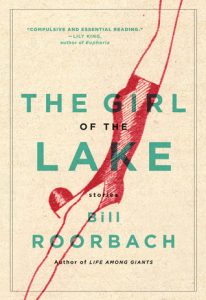 This collection opens with a tale so convincing dear reader will be googling Count Darlotsoff of the Russian Revolution. Roorbach’s stories ramble along pleasantly, with wit and wisdom, from a unique perspective. Then BOOM! Something astonishing happens, sometimes indicated by a simple line, “And fell into a basement hole,” and sometimes portraying a much larger concept, such as patricide. The tales delve into history—the aforementioned Russian Revolution; plunges deep into socio-political culture—“His father was an important king or chieftain in an area of central Africa he refused to call a country, an area upon which the Belgians and several other European powers had long imposed borders and were now instituting ‘native’ parliaments before departing per treaty after generations of brutal occupation;” and parses human emotions and relationship dynamics—“sharks unto minnows.” There’s even a ghost story, with elements of land conservation, familial squabbles, and burgeoning love. As diverse as the themes are, and as broad the representation of people, one story stands out for its LGBT ignorance, as a main character tells the benefactor of her theater, a widower asking for a kiss, “Marcia had politely allowed just one, then explained that while being a lesbian might not mean she was entirely unavailable, her long-term relationship did.” He then proceeds to win over her wife, and they merrily cavort about town, all three holding hands, doing everything as a threesome. Lesbian relationships are real relationships, and lesbians are not toys for a man’s pleasure. That being said, this is a blemish on a set of otherwise fascinating and weird and brilliant stories. The book is dedicated to Jim Harrison, whose fans will likely appreciate Roorbach’s work.
This collection opens with a tale so convincing dear reader will be googling Count Darlotsoff of the Russian Revolution. Roorbach’s stories ramble along pleasantly, with wit and wisdom, from a unique perspective. Then BOOM! Something astonishing happens, sometimes indicated by a simple line, “And fell into a basement hole,” and sometimes portraying a much larger concept, such as patricide. The tales delve into history—the aforementioned Russian Revolution; plunges deep into socio-political culture—“His father was an important king or chieftain in an area of central Africa he refused to call a country, an area upon which the Belgians and several other European powers had long imposed borders and were now instituting ‘native’ parliaments before departing per treaty after generations of brutal occupation;” and parses human emotions and relationship dynamics—“sharks unto minnows.” There’s even a ghost story, with elements of land conservation, familial squabbles, and burgeoning love. As diverse as the themes are, and as broad the representation of people, one story stands out for its LGBT ignorance, as a main character tells the benefactor of her theater, a widower asking for a kiss, “Marcia had politely allowed just one, then explained that while being a lesbian might not mean she was entirely unavailable, her long-term relationship did.” He then proceeds to win over her wife, and they merrily cavort about town, all three holding hands, doing everything as a threesome. Lesbian relationships are real relationships, and lesbians are not toys for a man’s pleasure. That being said, this is a blemish on a set of otherwise fascinating and weird and brilliant stories. The book is dedicated to Jim Harrison, whose fans will likely appreciate Roorbach’s work.
All posts by laelbr5_wp
Flash Fiction Friday: delving into the past to fill out the rest of the year
Golden Years
Suzanne and Harry had enjoyed their first day on safari. Their resort cabin opened to the outdoors on two sides. The guides assured them that they were safe from all creatures, but to remember to sleep under the mosquito netting. Harry brought drinks onto the deck, where they watched what wildlife they could see at dusk. It had been the best trip so far since their retirement four years ago. They had even met two couples from their state of Minnesota, Joanne and Don, and Mitzi and Harold (another Harry even!).
#
“I may be hard pressed to leave Africa, Harry. How can I go back to reality? It’s gorgeous here.” Suzanne reached for his hand across the small table between them.
“That it is, sweetheart. But go back we will, and then onto our next adventure. We’re too young to settle down just yet.” They laughed together, holding hands.
Susan’s smile drifted and she asked Harry, “Do you believe the guides? Do you think they’ve really had no unusual animal attacks here like at home? I can’t imagine it’s isolated. I wonder who’s not telling us what. Remember the Canadian moose herd overrunning Picksville? How frightening. I’m glad Jonathan moved away from Alaska last year.”
“Well, I did read about black mambas attacking a professor in South Africa, but that was in a newspaper here. And it was a poisonous snake to begin with, so I don’t know how unusual it was. Yeah, I’m glad Jonathan moved. He wishes his friend Robert had moved. You know his family included him in the mass funeral—there were so many. Weirdest thing I ever heard.” He squeezed her hand and lifted it to his mouth for a kiss.
They shook off the memory, drank their wine, and toasted the tail end of the sunset. On the way to the bedroom, they embraced and smooched. When they settled into bed, Harry made sure the mosquito netting was encircling them completely—no sense getting malaria. They slept the sound sleep of the truly satisfied and wine satiated. They did not hear the driver ants entering their abode, not even when they started crawling up the bed by the hundreds, by the thousands, by the millions. They woke when the insects covered their bodies, but it was too late. Ants stung them endlessly. They passed out from shock and were invaded in every orifice.
Their new friends were next in line, being right next door. No warning was given throughout the resort, as the ants smothered screams with the multitude of their bodies. By the time they reached Harry and Suzanne’s other new friends, they had silently killed 37 couples on safari in their retiring years. Had they not continued on up to the main office, the hostess and guides would have had a lot of explaining to do to quite a few American families. As it was, the Kenyans would have to be identified by dental work as well. The ants ate everything they covered. Not a word made it to the newspapers.
###
Francesca Hornak—British Author and Journalist
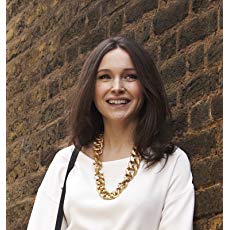 I won Seven Days of Us through Goodreads and devoured it, a story full of complicated family dynamics imploding from mandatory quarantine due to a daughter’s work in treating an epidemic—my review here. Francesca is not the first novelist I’ve interviewed who is also a journalist, which I expect imbues their fiction with nuanced description from honed observation skills, and a broad sense of the real world. I’m honored to share another talented journalistic novelist with my readers. If you haven’t yet read Seven Days of Us, I recommend it highly. Enjoy learning about Francesca’s process and creativity. Links to connect with Francesca and purchase Seven Days of Us are at the end of the interview.
I won Seven Days of Us through Goodreads and devoured it, a story full of complicated family dynamics imploding from mandatory quarantine due to a daughter’s work in treating an epidemic—my review here. Francesca is not the first novelist I’ve interviewed who is also a journalist, which I expect imbues their fiction with nuanced description from honed observation skills, and a broad sense of the real world. I’m honored to share another talented journalistic novelist with my readers. If you haven’t yet read Seven Days of Us, I recommend it highly. Enjoy learning about Francesca’s process and creativity. Links to connect with Francesca and purchase Seven Days of Us are at the end of the interview.
Describe your writing process—schedule, environment(s), strategies / techniques, and inspirations big and small, tangible and abstract: writers, quotes, objects, places, ideas, etc.
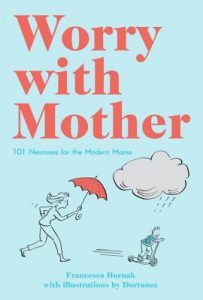 I try to write every weekday morning between 9:15 and 12:15, which is the window when both my children are in nursery. I’m actually glad it’s so regimented, as it enforces a kind of ‘exam conditions’ pressure, which I find easier than if I had all day at my disposal. I could write at home, but I generally go to a café or library, as I like to work surrounded by strangers, and I always get more done in a place where I’m not connected to the Wi-Fi. I usually begin by having a really elaborate breakfast over my laptop, which I definitely wouldn’t recommend as a writing strategy, but I’ve now come to believe that I physically can’t write without a particular kind of coffee/juice/toast/peanut butter etc. Other than that I’m not too particular; I just always avert my eyes from the Wi-Fi password and usually wear earplugs—unless I’m eavesdropping on an especially interesting conversation. Inspiration is a mix of internal and external. It might be something I’ve experienced, that I want to relive through a character., or it might be a news story, or a chance conversation, that sparks an idea.
I try to write every weekday morning between 9:15 and 12:15, which is the window when both my children are in nursery. I’m actually glad it’s so regimented, as it enforces a kind of ‘exam conditions’ pressure, which I find easier than if I had all day at my disposal. I could write at home, but I generally go to a café or library, as I like to work surrounded by strangers, and I always get more done in a place where I’m not connected to the Wi-Fi. I usually begin by having a really elaborate breakfast over my laptop, which I definitely wouldn’t recommend as a writing strategy, but I’ve now come to believe that I physically can’t write without a particular kind of coffee/juice/toast/peanut butter etc. Other than that I’m not too particular; I just always avert my eyes from the Wi-Fi password and usually wear earplugs—unless I’m eavesdropping on an especially interesting conversation. Inspiration is a mix of internal and external. It might be something I’ve experienced, that I want to relive through a character., or it might be a news story, or a chance conversation, that sparks an idea.
Walk me through your publishing process from final draft to final product—who does what, your input, and marketing done by you as the author, and talk to me about pre-empted TV rights for Seven Days of Us.
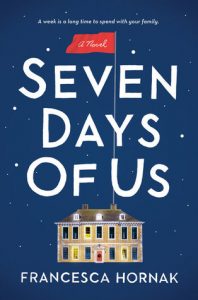 The final product wasn’t hugely different to the final draft, and luckily my editors (I edited UK and US editions simultaneously) agreed on everything. There were two scenes in my draft that we all felt were implausible or melodramatic, so I cut one and changed the other. Jesse’s character (the illegitimate son who gatecrashes his birth father’s quarantine) was also given a little more backstory and depth. The rest of the editing was mostly me finessing the wording. I’d rushed submitting to publishers, as my agent and I were both pregnant and wanted to get the manuscript out before we gave birth. So I wanted to perfect nearly everything—towards the end my US editor did suggest I ‘cease and desist’….
The final product wasn’t hugely different to the final draft, and luckily my editors (I edited UK and US editions simultaneously) agreed on everything. There were two scenes in my draft that we all felt were implausible or melodramatic, so I cut one and changed the other. Jesse’s character (the illegitimate son who gatecrashes his birth father’s quarantine) was also given a little more backstory and depth. The rest of the editing was mostly me finessing the wording. I’d rushed submitting to publishers, as my agent and I were both pregnant and wanted to get the manuscript out before we gave birth. So I wanted to perfect nearly everything—towards the end my US editor did suggest I ‘cease and desist’….
The marketing and publicity I’ve done has mostly been writing pieces for magazines, radio interviews, the odd talk, and Q&As like these. It’s all fun to do, and working in journalism means the press side isn’t new to me—I’m just on the other side to before. The TV rights were bought by a company called Little Island before the book was published, after my agent sent the manuscript out to a few scouts, and now Entertainment One is on board too which is great.
Tell me about your support system online and IRL—who are your biggest cheerleaders, and what keeps you going?
My biggest real life cheerleaders are my husband, mother, agent and editor—although I mostly really enjoy writing fiction, so I don’t really feel in need of a support system (it’s less stressful than working at a magazine!). I’m not part of any online writing community, but I have a few friends who happen to be writers who I sometimes run plot dilemmas by via email. What keeps me going is the fact that I always need that next chunk of advance money! And I don’t like to miss deadlines.
How has your journalist background prepared you for writing novels—how does your life influence your art and vice versa?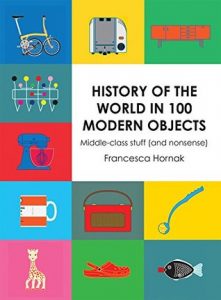
I think the obvious thing is that it helps you to see writing as a job, which is useful for actually finishing a draft. But I hope it also makes me more rigorous about what I’m offering a reader. As a commissioning editor and features writer, I spent ten years thinking ‘Would anyone want to read this story?’ or ‘Has this been done before?’ or ‘Is this the most entertaining way I can convey this information?’ and I’m glad I had that training. I don’t think my fiction writing especially influences my life, except that half of my brain is always thinking about what I could be writing. But that was the same when I was a journalist.
What do you love most about your creativity?
The escapism of diving into my own fictional world every day, I think. It’s like having a telescope onto a parallel universe. I also really enjoy wearing athleisure for work.
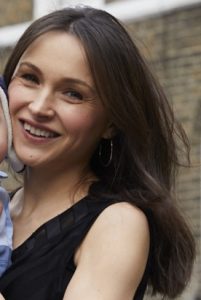 Connect with Francesca:
Connect with Francesca:
Everyday Enchantments by Maria F. DeBlassie
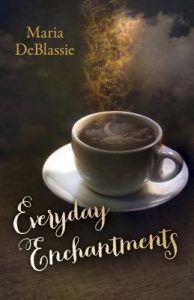 This is a light and breezy book about the small joys of life, from gardens to books to sweaters to tea time. Even if one doesn’t share the same passions, DeBlassie writes with such verve that dear reader feels the warm fuzzies. If all is not going well, a chapter from this lovely book could help reframe the day. I was fortunate to receive a digital copy from the publisher through NetGalley of this book that reminds us that the small things matter, and that we choose how we view our world.
This is a light and breezy book about the small joys of life, from gardens to books to sweaters to tea time. Even if one doesn’t share the same passions, DeBlassie writes with such verve that dear reader feels the warm fuzzies. If all is not going well, a chapter from this lovely book could help reframe the day. I was fortunate to receive a digital copy from the publisher through NetGalley of this book that reminds us that the small things matter, and that we choose how we view our world.
Lemongrass Hope by Amy Impellizzeri
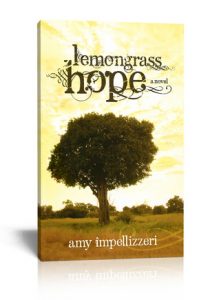 Kate chose a lifemate over a soulmate. Her marriage comes to a crossroads in her mind, and she is given a literal chance for a do-over, a gift of time shifting via the Devil’s Triangle. She must choose between her soulmate and her wrecked life as a disillusioned wife and mother. Impellizzeri brilliantly portrays a woman who inadvertently contributes to the misery in her own life by refusing to let the past be and give herself fully to her present. She learns that no matter what choices are made, and invested in, some things cannot be controlled. There are so many layers to this story, including the parallels of the legendary tale told by the ship’s captain to Kate’s life and the tricky ending to her circular thinking, both impossible to escape from…or not. That ending, circling back to the beginning, is so clever. Fans of time travel, star-crossed love, and characters whose hearts grow three sizes will love this story.
Kate chose a lifemate over a soulmate. Her marriage comes to a crossroads in her mind, and she is given a literal chance for a do-over, a gift of time shifting via the Devil’s Triangle. She must choose between her soulmate and her wrecked life as a disillusioned wife and mother. Impellizzeri brilliantly portrays a woman who inadvertently contributes to the misery in her own life by refusing to let the past be and give herself fully to her present. She learns that no matter what choices are made, and invested in, some things cannot be controlled. There are so many layers to this story, including the parallels of the legendary tale told by the ship’s captain to Kate’s life and the tricky ending to her circular thinking, both impossible to escape from…or not. That ending, circling back to the beginning, is so clever. Fans of time travel, star-crossed love, and characters whose hearts grow three sizes will love this story.
Flash Fiction Friday: delving into the past to fill out the rest of the year
Come one Come All
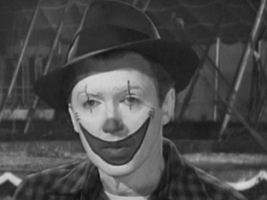 Life as a clown ages you in ways regular life don’t. Grease paint removes your identity, humor replaces your personality, and the big shoes are just plain heavy. All towns blend together till I’m not sure where I am anymore. I just sleep in my rollicking cot as they drive us to the next little burg.
Life as a clown ages you in ways regular life don’t. Grease paint removes your identity, humor replaces your personality, and the big shoes are just plain heavy. All towns blend together till I’m not sure where I am anymore. I just sleep in my rollicking cot as they drive us to the next little burg.
Oh, but when I’m in full costume, under those lights spotlighting me—Me! The forty-five minutes I’m entertaining hundreds of children, those laughing faces are pure gold, a far better payment than the mere pittance they call my wage.
Afterward, I’m reminded of my reason for being here, makeup covering the scars that changed my life, the fact that no woman would want a man who frightens children and could never give her any. The circus is my only opportunity to observe those beautiful treasures. I people watched to my heart’s content—townies and cirkys.
Jenina, the horse trainer’s assistant and wife, cried nightly as a routine. As I said, it’s a hard life, brings the worst out of some. Franco prided his horses. She came to me one night in an unusual state, meaning she was naked as a jaybird, holding a toga in her hand. She’d been duped. Franco had bragged all day of his prowess as a lover, that he would sure be galloping tonight. We all could clearly see that it was young Lorraine, the Acrobat, who was in heat. But poor, sweet Jenina was blinded by love.
I led her into my carriage and put the toga around her. We drank some hot tea together quietly. I ignored that fact that she let the toga fall. Her eyes were blank. When she finished the tea, she dropped her cup, leaned over and started rubbing makeup off my face. Now no-one has ever seen my face in all its scarred ugliness since I joined this traveling caravan. So I jumped up and backed away.
Just as startling, she spoke, “Let me see. I have shown you my real face.”
I sat down, legs twitching, fingers jumping. She used her toga and the rest of the tea to reveal me. I felt nakeder than her, as though she had peeled my skin back and was even now counting my thoughts. She ran a finger down the daddy scar, over my nose and across my left cheek.
When life happens to circus folk, we don’t fix it, we don’t talk about it. We deal with bumps in the road and keep moving on. So when she came to me two weeks later in her usual lovely birthday suit, toga in one hand and two eyeballs the same grey-blue as Lorraine, the Acrobat’s, in the other, I told her to put her little things in a jar I opened for her. I then said we might go swimming in that pond nearby to get that red grease paint off her. I asked if she was done painting and everything was put away safe. She nodded.
She came to me looking like a snake had bit her. She left me with the relief that I had sucked the poison out. No one blinked. Circus folk run away all the time. Acrobats come and go. We had no fear of punishment from regular society. One less circus performer was nothing to them.
Richard Zacks—Author of Historical Non-Fiction and Hollywood Historical Consultant
 Richard Zacks was born in Savannah, Georgia, but grew up in New York City. As a teenager, he gambled on the horses, played blackjack in illegal Manhattan card parlors, and bought his first drink at age 15 at the Plaza Hotel. He studied Arabic in Cairo, Italian in Perugia, and French in the vineyards of France. He wrote a syndicated column for four years carried by the NY Daily News, Boston Globe, Dallas Morning News, and many others. He keeps a hole-in-the-wall office in Manhattan. Zacks spent more than three years researching The Pirate Hunter, including months at the Public Record Office in London (where he found a pirate prisoner’s long-lost diary). He is the author of six books of unusual research, including History Laid Bare and perennial book club favorite An Underground Education—he dug up stories about Edison’s electric chair and Lincoln’s tentative plan to ship out the freed slaves. He also authored Island of Vice (about Teddy Roosevelt as NYC police commissioner), Chasing the Last Laugh (about Mark Twain’s round-the-world comedy tour) and The Pirate Coast (about America’s first overseas covert op in 1805).
Richard Zacks was born in Savannah, Georgia, but grew up in New York City. As a teenager, he gambled on the horses, played blackjack in illegal Manhattan card parlors, and bought his first drink at age 15 at the Plaza Hotel. He studied Arabic in Cairo, Italian in Perugia, and French in the vineyards of France. He wrote a syndicated column for four years carried by the NY Daily News, Boston Globe, Dallas Morning News, and many others. He keeps a hole-in-the-wall office in Manhattan. Zacks spent more than three years researching The Pirate Hunter, including months at the Public Record Office in London (where he found a pirate prisoner’s long-lost diary). He is the author of six books of unusual research, including History Laid Bare and perennial book club favorite An Underground Education—he dug up stories about Edison’s electric chair and Lincoln’s tentative plan to ship out the freed slaves. He also authored Island of Vice (about Teddy Roosevelt as NYC police commissioner), Chasing the Last Laugh (about Mark Twain’s round-the-world comedy tour) and The Pirate Coast (about America’s first overseas covert op in 1805).
Describe your writing process—schedule, environment, tactics, and inspirations—and research protocols; how do you choose your subject matter?
My writing process? I usually wait until my self-loathing over procrastinating is so great that it is a choice: write something or change professions. (I was a house painter in college and I really don’t want to go back to that.) I have an office in an old New York building near Union Square Park. I go every day.
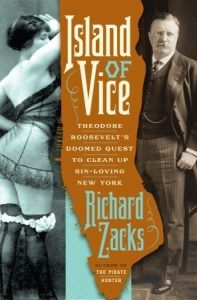 Books come in phases. I love the research. It plays to my voyeuristic/private eye tendencies. I love snooping into lives in the past, reading personal letters, trying to build out entire scenes. Since I was trained as a journalist before becoming a historian, I lean hard towards Who, What, When and Where. I want physical details, so I build elaborate timelines, sometimes 400 pages long… Aug. 22, 1893, Aug. 24, 1894… and then I layer in every detail I can find with its source. Over time, these random details accumulate and a clear picture of many individual days starts to emerge. This format of a giant timeline helps with “plotting” the non-fiction narrative. Yes, it is non-fiction, but writers have huge choices as to structure and I always want to build a plot and suspense, because that’s what I need as a reader to keep me interested.
Books come in phases. I love the research. It plays to my voyeuristic/private eye tendencies. I love snooping into lives in the past, reading personal letters, trying to build out entire scenes. Since I was trained as a journalist before becoming a historian, I lean hard towards Who, What, When and Where. I want physical details, so I build elaborate timelines, sometimes 400 pages long… Aug. 22, 1893, Aug. 24, 1894… and then I layer in every detail I can find with its source. Over time, these random details accumulate and a clear picture of many individual days starts to emerge. This format of a giant timeline helps with “plotting” the non-fiction narrative. Yes, it is non-fiction, but writers have huge choices as to structure and I always want to build a plot and suspense, because that’s what I need as a reader to keep me interested.
Choosing a topic is the hardest part of the process. I have an office crammed with rejected ideas. I want to pick a topic that fascinates me and will also lure a large enough audience. (Pirate Hunter sold more than 200,000 copies.) I have spent far too much time on Casanova and Sir Richard Burton without green-lighting anything. Lately I have done work for Hollywood. I was the historical consultant for The Alienist, Caleb Carr’s great suspense novel in 1890s New York. Two of my books are under option, and I am working with the producers to develop the material, but I need to re-focus on finding a book idea.
I should read non-fiction all day long, but I am reading mostly fiction these days. And then there’s the NYT crossword puzzle.
Walk me through your publishing process—who does what and when, how much input you have throughout, and what marketing you’re expected to do as the author.
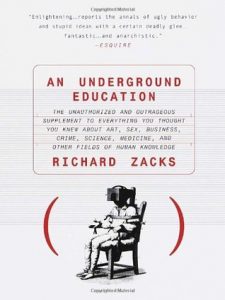 A friend described his publishing process as “the calm before the calm.” Thankfully, I have never experienced that. The PR departments of the various publishers have gotten me piles of radio interviews over the years and bookstores appearances. I LOVE giving my PowerPoints, especially this last one on Twain, since it generated lots of laughs. I never knew how absolutely glorious it feels to make two hundred people laugh. Thank you, St. Louis.
A friend described his publishing process as “the calm before the calm.” Thankfully, I have never experienced that. The PR departments of the various publishers have gotten me piles of radio interviews over the years and bookstores appearances. I LOVE giving my PowerPoints, especially this last one on Twain, since it generated lots of laughs. I never knew how absolutely glorious it feels to make two hundred people laugh. Thank you, St. Louis.
I create my own website, because it’s fun and easy. I should do more on Facebook. I don’t tweet, because I think I would get addicted. Basically: radio, speeches, and the occasional self-promoting op-ed or companion article. I want people to read my book, so promotion is not too painful.
Tell me about your support system online and IRL—who sings loudest your praises and who pats your back?
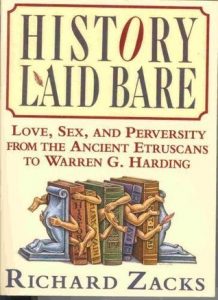 My wife is a literary agent, so she reads the near-final draft. She is brutally honest, after I convince her yet again that I want to be brutally honest. I try not to bother her too much, but she is really good at what she does, and has dozens of paying clients to serve. Reviews have been solidly positive over the years, but I did get a complete slam in one major publication. I was flabbergasted. I complained to the book editor and he asked whether I believed in freedom of the press and of opinions. I said “Sure,” but that he shouldn’t let children play with matches. I also like Ben Franklin’s line about Freedom of the Press being accompanied by Freedom of the Cudgel. Ka-boom.
My wife is a literary agent, so she reads the near-final draft. She is brutally honest, after I convince her yet again that I want to be brutally honest. I try not to bother her too much, but she is really good at what she does, and has dozens of paying clients to serve. Reviews have been solidly positive over the years, but I did get a complete slam in one major publication. I was flabbergasted. I complained to the book editor and he asked whether I believed in freedom of the press and of opinions. I said “Sure,” but that he shouldn’t let children play with matches. I also like Ben Franklin’s line about Freedom of the Press being accompanied by Freedom of the Cudgel. Ka-boom.
Your question was upbeat in tone. I love getting passionate positive emails from strangers. I used to say that was the best part of the publishing process and almost mean it.
In what ways does life influence your art and vice versa; do you harbor such secrets as your subjects?
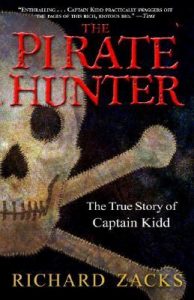 My subjects reflect my personality, which I would describe as subversive, voyeuristic, adventurous, with a solid sense of humor. There is also a Walter Mitty aspect, slipping into the lives of others.
My subjects reflect my personality, which I would describe as subversive, voyeuristic, adventurous, with a solid sense of humor. There is also a Walter Mitty aspect, slipping into the lives of others.
My first book was sex in history; my second book aimed to one-up the experts and deliver contrarian views. Then came my pirate phase. I live a respectable life; who wouldn’t want to be an outlaw, a pirate… at least for a week? Robbing from ships owned by stodgy arrogant nobleman who never worked a day in their lives, drinking rum, dancing to the hornpipe, eating shellfish, shooting cannons. (The older I get, the harder it is to justify.) Then… to go along on a covert op to rescue 300 American hostages in Tripoli… then explore vice in 1890s New York… finally spend a few years with Mark Twain when he was down and out… and very darkly funny.
What do you love most about your creativity?
Life is really swell in the middle of researching a book.
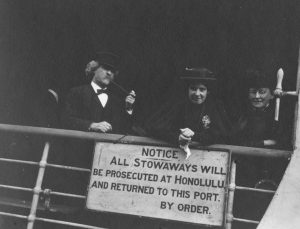
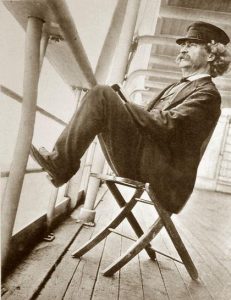
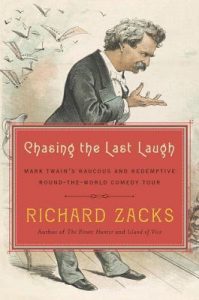 Connect with Richard Zacks:
Connect with Richard Zacks:
Moon Sisters by Therese Walsh
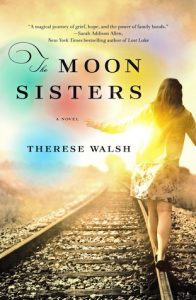 Their mother’s death sends Jazz and Olivia Moon on figurative and literal journeys of grief. Olivia, a synesthete with multiple sensory connections, sets off to see the ghost lights of the bog, an elusive dream of her mother’s for finishing her fantasy novel. Jazz grew up with a different mother, a colder mother, with misplaced expectations of being her sister’s keeper, this heightened sense of responsibility forcing her to “escort” Olivia on her quest. Secrets are exposed that rile and enlighten, urging them to look closer at each other, and determine what family means.
Their mother’s death sends Jazz and Olivia Moon on figurative and literal journeys of grief. Olivia, a synesthete with multiple sensory connections, sets off to see the ghost lights of the bog, an elusive dream of her mother’s for finishing her fantasy novel. Jazz grew up with a different mother, a colder mother, with misplaced expectations of being her sister’s keeper, this heightened sense of responsibility forcing her to “escort” Olivia on her quest. Secrets are exposed that rile and enlighten, urging them to look closer at each other, and determine what family means.
Walsh portrays a hidden trauma of a daughter, who passes on this pain to her own daughters, so well that dear reader readily sympathizes with all of the characters. Many real-life lessons are learned, on family, relationships, communication, expectations, and loss. This is a gorgeous story of living life differently, accepting others as they are, and being true to yourself. I was fortunate to receive this wonderful novel in an author giveaway, and I highly recommend it to fans of Heather Burch, Kristin Hannah, Diane Chamberlain, and Kerry Anne King.
The Secrets Between Us by Thritty Umrigar
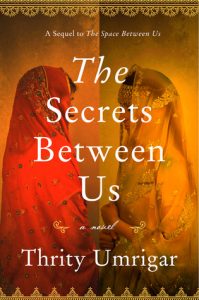 Bhima recovers and moves on after her friend Sera’s betrayal, though she cannot think evil of her, even if her granddaughter Maya holds Sera in contempt. The sequel to The Space Between Us follows Bhima in her struggle to keep her emotions and memories from derailing her plans to put Maya through college. Her new jobs open up opportunities for both of them, and expose Bhima to a new Mumbai. She ends up with partners in a new venture. Bhima is always evolving and accepting new paradigms in her desire to remain relevant in her granddaughters’ world. Umrigar brilliantly represents a woman who holds herself above the slum in which she lives, who believes if she hasn’t dignity, she has nothing, that circumstances do not define her. This next chapter in the life of an Indian woman whose life has unraveled delves deeply into the cultural mores of socioeconomic levels and the caste system, and the slowly shifting philosophies of those mores that question the caste system. Secrets come to light and Bhima goes with the flow. She truly is an extraordinary character, and a continuation of her story would be a joy. A trilogy would perfectly round it out (hint, hint Thritty). Readers of Lisa See, Isabel Allende, and Louise Farmer Smith will appreciate Umrigar’s work.
Bhima recovers and moves on after her friend Sera’s betrayal, though she cannot think evil of her, even if her granddaughter Maya holds Sera in contempt. The sequel to The Space Between Us follows Bhima in her struggle to keep her emotions and memories from derailing her plans to put Maya through college. Her new jobs open up opportunities for both of them, and expose Bhima to a new Mumbai. She ends up with partners in a new venture. Bhima is always evolving and accepting new paradigms in her desire to remain relevant in her granddaughters’ world. Umrigar brilliantly represents a woman who holds herself above the slum in which she lives, who believes if she hasn’t dignity, she has nothing, that circumstances do not define her. This next chapter in the life of an Indian woman whose life has unraveled delves deeply into the cultural mores of socioeconomic levels and the caste system, and the slowly shifting philosophies of those mores that question the caste system. Secrets come to light and Bhima goes with the flow. She truly is an extraordinary character, and a continuation of her story would be a joy. A trilogy would perfectly round it out (hint, hint Thritty). Readers of Lisa See, Isabel Allende, and Louise Farmer Smith will appreciate Umrigar’s work.
Flash Fiction Friday original
Be Quiet…Don’t Breathe
Suhatra can move only her eyes. In her peripheral vision, she watches him flip switches like a mad scientist. Frankenstein images come to her, unbidden, terribly unwanted. The tingling begins in her fingers, moving up. This is so nerve-wracking, she’s afraid of farting right out loud. This thought causes her to make the tiniest little hiccough. He spins and leans into her face. “Be quiet. Don’t breathe. We’re very nearly ready to begin.”
He explains the anesthetic effect of the ionization process. The tingling continues, spreading throughout her body, then down to her toes. When it reaches her face, she absolutely, positively wants to scream, “Stop!” She lies completely still, keeping her eyes open, waiting for the cue to focus on that dot on the ceiling. This is supposed to hold her eyes in place long enough for the molecular rearranging to settle her new features without error.
The horror stories she’s heard. Wandering eyes causing a living nightmare of a cubist face make her want to focus now. Yet she’s been told that everything must be still at once, no breathing even. The eyes must focus on the dot at the proper time, as concentration may wane if held too long. She wants no cubist look, just to walk free again as an unrecognized individual. He whispers, so as not to disturb her stillness, “it’s time now to focus on the dot. In 7 seconds, your molecules will rearrange to create a new you. You won’t recognize yourself. Ready . . . 7 . . . 6 . . . 5 . . . 4 . . . 3 . . . 2 . . . 1 . . . Voila! You are no longer gorgeous. You are normal. Normal, I say. Sit up, dear. Look. Look.”